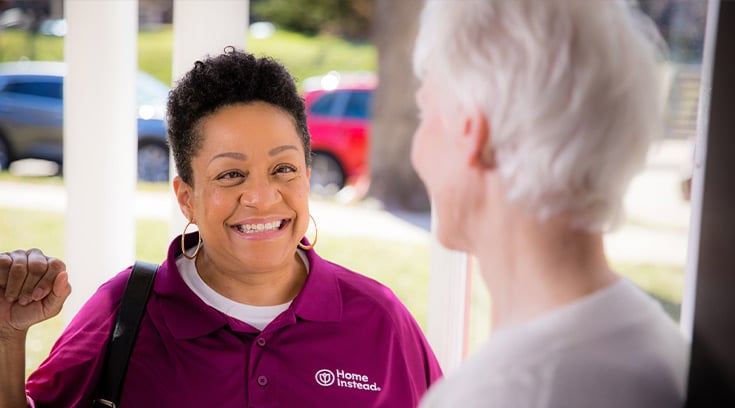Guilt: it seems to go with the territory when you’re a family caregiver, right? You feel guilty not spending enough time with Mom. But when you’re with her, you’re plagued with guilt about neglecting family and friends who may be needing your time as well.
Or, you can’t stop blaming yourself for losing your temper with Dad. And the thought of placing him in a nursing home has your stomach tied in knots. You decide to take a night off – get away from it all at a movie with a friend. But you spend the entire time worrying about what your dad is doing and feeling guilty that you aren’t there with him.
An Emotional Roller Coaster
Many emotions surface when you take on the job of caregiving, noted Donna Schempp, LCSW, writing for the Family Caregiver Alliance in an article entitled “The Emotional Side of Caregiving.” “Some of these feelings happen right away and some don’t surface until you have been caregiving for a while. Whatever your situation, it is important to remember that you, too, are important. All of your emotions, good and bad, about caregiving are not only allowed, but valid and important,” she added.
“Many feelings come up when you are caring for someone day in and day out. Many caregivers set out saying, ‘This won’t happen to me. I love my mother, father, husband, wife, sister, brother, friend, etc.’ But after a while, the ‘negative’ emotions that we tend to want to bury or pretend we aren’t feeling come up. Caregivers are often reluctant to express these negative feelings for fear they will be judged by others (or judge themselves) or don’t want to burden others with their problems.”
Coping with Guilt
So how do you cope with this guilt? “You need permission to forgive yourself,” Schempp said. “You can’t be perfect 24/7. It’s impossible to be in perfect control of how you feel at all times. We all carry around a lot of ‘shoulds,’ such as ‘No one will do as good of a job as I do, so I have to be here all the time.’ Or ‘If I leave and something happens, I will never forgive myself.’ Consider changing guilt into regret, ‘I’m in a difficult situation and I have to make difficult decisions sometimes.’ ‘I regret that I am human and get impatient sometimes.’ ‘I am doing the best I can even though things go wrong from time to time and I regret that I am not perfect.’ “
Five Emotional Guilt Trips
The following are five “guilt trips” that are part of many family caregivers’ emotional journeys and what you can focus on instead:
1. I feel guilty for not spending more time with Mom.
When Mom begs you to stay longer or to come visit more often, it can feel like a real guilt trip, especially when busy schedules and distance make visiting difficult, and when you know your visits are the highlight of her otherwise lonely existence. Yet trying to satisfy all the demands of work, family, and everything else will only stress you out and keep you from making the most of the time you do have.
What to focus on instead:
Try to make the time you do spend together as meaningful as possible. Check out these tips for how to get mealtime conversations going or for sharing memories with your loved one. For the times you can’t be there, consider how companionship services could help. You won’t feel as guilty "abandoning" Mom if she has someone coming on a regular basis whose company she enjoys and who can provide conversation, facilitate activities, help around the house, and provide transportation wherever she needs to go.
2. I feel guilty when I lose my patience with Dad.
It’s pretty much a given that an aging parent will try your patience at one point or another. Family caregivers of an aging loved one with dementia who exhibits repetitive behaviors may find this is especially true. But there are more productive ways to handle impatience than to feel guilty about it.
What to focus on instead:
Patience typically wears thin when you’re worn out and exhausted. If you feel like you’re reaching the end of your rope, use that as a warning sign that you need to take a break. It’s important to care for yourself and make sure you’re getting enough rest so you can be at your best for your loved one. Put your energy into finding time for a break rather than dwelling on feelings of guilt. (See number 3.)
3. I feel guilty when I take time to myself.
Putting another person’s needs before your own is a sign of love. You may feel it’s your duty to devote all of your time and energy to care for your parents the way they cared for you as a child. This is your chance to give back and you don’t want to feel selfish or let your loved one down by putting your needs before theirs. But you can’t ignore your own needs forever and it’s self-defeating to feel bad about indulging a little in yourself.
What to focus on instead:
The only way to sustain the love and care you feel your loved one deserves is to take good care of yourself as well. Remind yourself that you can be a better caregiver to your loved one when you get enough rest, eat healthy meals, and have a chance to attend to your own needs. Self-Care is important for everyone, especially family caregivers. Remind yourself that self-care is not selfish, but necessary..
4. I feel guilty for putting Dad in a nursing home.
Maybe you think it’s not what Dad would have wanted, or you wonder if there is more you could’ve done to keep him at home. But there’s no use dwelling on the past, which you cannot change.
What to focus on instead:
If there’s a chance Dad may recover from his current illness that renders nursing help necessary, start planning ahead to make the transition home possible. If it’s not feasible to move your loved one out of the nursing home, do what you can to make his time there as comfortable as possible. Visit as often as you can and make your visits meaningful (see number 3). Bring photos and decorations to personalize the room and help make it feel more like home.
Above all, remember that you can’t be an effective family caregiver if you don’t take care of yourself, both physically and emotionally.
5. I feel guilty for getting angry or frustrated.
If you’re like most people, you may view emotions like anger or frustration as a sign of weakness. People tend to hide emotions they feel are negative. But they’re just as natural as emotions like joy and love. It can be both stressful and dangerous to your health to keep negative emotions buried inside.
What to focus on instead:
While it’s true that too much negativity can be toxic to those around you, it’s important that you have a safe outlet for those emotions. Vent to a friend, diffuse your anger or depression through exercise, grab a pillow to punch or find a secluded place to have a good cry. Keeping the emotional and physical stress of caregiving in check can be challenging, but critical task for overall good health.
If you're struggling with staying positive throughout the caregiving journey, these nine tips may help you be more optimistic.
Respite Care Services Near Me




